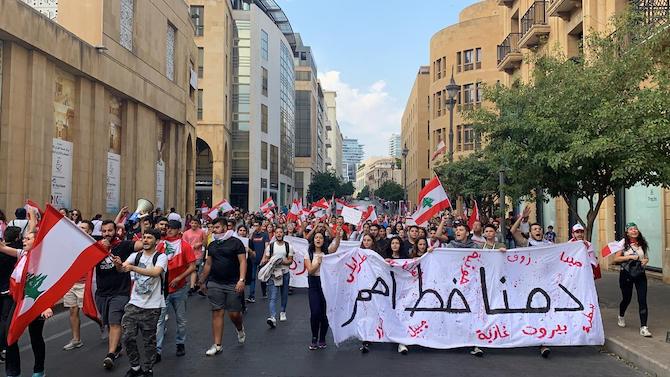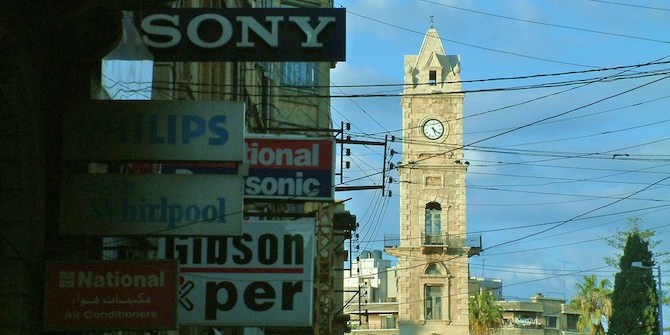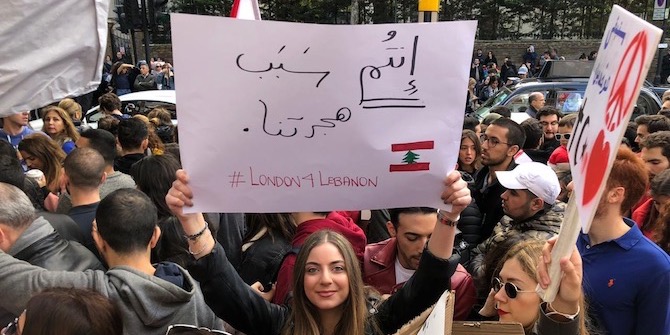by Jinan S. Al-Habbal & Carmen Geha

Two years have passed since hundreds of thousands of Lebanese protestors from all sections of society spontaneously took to the streets on 17 October 2019 to oppose the proposed taxes, including a USD$6 monthly fee on WhatsApp calls, of the then government of Saad Hariri. The unprecedented leaderless protests, known as the October Revolution, shortly evolved into calls to overthrow the sectarian regime and its clientelist leaders – the main culprits behind the protestors’ grievances and the deteriorating socioeconomic situation in Lebanon. Hariri resigned amid the protests, but this failed to satisfy the demonstrators, and protests continued into 2020.
A few months later, the protests decreased in size and frequency and eventually fizzled out, shattering the dreams of political change, especially after the government imposed the first lockdown to tackle the rising cases of COVID-19 in March 2020. Demonstrators returned to the streets after the deadly Beirut port blast on 4 August 2020 – one of the biggest non-nuclear explosions in history which was the direct consequence of authorities’ carelessness and improper storage of around 2,750 tons of ammonium nitrate in a port warehouse – forcing the government of Hassan Diab to resign. Since then, Lebanon’s crippling economic crisis has left around three-quarters of the population in poverty, plunged the country into darkness due to a fuel shortage, jeopardised the healthcare system, and pushed thousands to emigrate.
Despite the protests and mounting crises, the Lebanese consociational power-sharing political system, which divides state positions along confessional lines, has remained resilient. While there is a growing literature on the concept of resilience, we specifically use the term to refer to the stability of the regime resulting from the resilience of its leaders and their clientelist networks that are endorsed by the international community. So how did the regime manage to emerge unscathed, with its political leaders still in power? And how do activists resist such an establishment that is marked by decades of corruption and mismanagement?
In our Middle East Centre collaboration project with the American University of Beirut, we examine the counter-revolutionary characteristics of the Lebanese regime and its reaction towards the protest movement of 2019, in which it sought to sustain itself and its interests. In an attempt to clamp down on the protest movement, President Michel Aoun shared his willingness to meet with demonstrators and the government approved a package of economic reforms, in the early days of the protests. Some established political parties even moved to co-opt and hijack the protests by involving themselves in their planning and urging their supporters to participate in them. A member of the Druze Progressive Socialist Party was the first victim to be shot dead by a soldier during the protests.
However, when politicians’ co-optation mechanisms failed to quell the nationwide protests, they resorted to systematic violent attacks against the demonstrators. For instance, a mob of supporters of the Shi‘a political parties Hizbullah and Amal attacked protestors and tore up their tents in downtown Beirut while chanting sectarian slogans. Hundreds of protestors were also met with the use of excessive force, arbitrary detention, and torture by the state security forces, who have still not been held accountable.
We also focus on the structural obstacles and limitations that hinder effective activism and the imbalanced relationship between the activists whose number is limited and who lack financial support and the sectarian political elite who have access to state resources and institutions, foreign funding, and weapons. We follow activists’ stories and strategies of non-violent civil resistance in their pursuit of implementing reforms and change beyond the protest movement. Among such tactics have been calls for civil disobedience and a campaign to publicly shame politicians. But most importantly, emerging political movements have been established to defy the sectarian political system, with an anti-sectarian coalition sweeping the majority of seats in the Order of Engineers and Architects elections, in addition to the victory of secular clubs in student elections at reputable universities. These movements will soon be put to the test during the upcoming parliamentary elections that are scheduled for March 2022, although they might be postponed as politicians fight over the electoral law in their usual bid to gain more seats and hinder democratic practices.
By relying on fieldwork interviews with activists and building on existing literature on consociationalism and social movements, we aim to shed light on the actions and methods that have been able to infiltrate the consociational political system, despite the lack of any systemic overhaul. In documenting these instances of measured success, we aim to show how non-violent civil resistance can become a powerful form of dissent that challenges sectarian hegemony, informs political agency, and assists in effective activism beyond protest movements in Lebanon.
This blog post introduces the research project Consociationalism and Civil Resistance in Lebanon, which is in collaboration with the American University of Beirut and part of the LSE Middle East Centre Academic Collaboration with Arab Universities Programme.







I will totally agree and support this protest